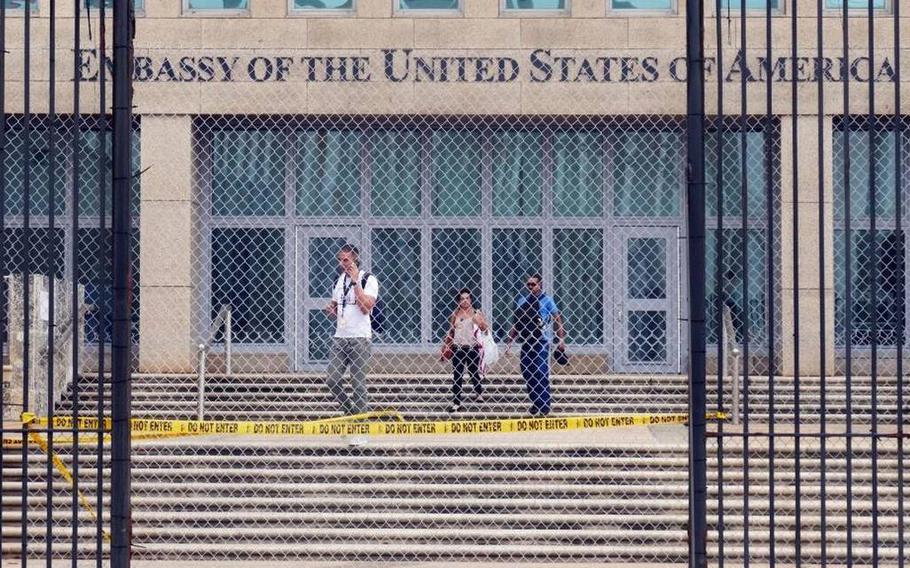
The U.S. embassy in Havana. (Emily Michot, Miami Herald/TNS)
(Tribune News Service) — A review board at the National Institutes of Health is conducting an internal investigation of a study about Havana Syndrome that did not find brain damage in patients, following complaints from participants and questions from Congress about newly reported information suggesting Russia might be behind directed energy attacks against U.S. officials.
The research, conducted between June 2018 and November 2022, examined former and active U.S. officials injured in mysterious incidents around the world associated with a cluster of symptoms known as Havana Syndrome. U.S. officials earlier suspected Russia was the culprit, but in March of 2023 the U.S. intelligence community released an assessment concluding that it was unlikely that a foreign adversary was behind a global campaign of attacks against the U.S.
Earlier papers published by teams of doctors treating some of these patients soon after they started feeling sick found they had injuries in the brain and inner-ear damage.
However, the NIH researchers said that they could find no evidence of brain injury after studying the patients’ MRIs and blood work, results they published in two articles in the Journal of the American Medical Association in March.
That didn’t settle the debate about the “anomalous health incidents,” the government’s term for Havana Syndrome. Scientists involved in other research projects about Havana Syndrome immediately questioned those results, pointing to flaws in the new study’s methodology and sample of patients.
Some participants also accused NIH officials and researchers involved in the study of bias, misreporting the data about brain injuries under pressure from the CIA and improperly sharing confidential medical information, according to a formal complaint sent to the NIH and its Institutional Review Board before the results went public. The complaint, first reported by the Miami Herald, also said patients were coerced into taking part in the study and were told they couldn’t get treatment elsewhere if they refused.
The NIH Institutes went ahead with the publication of the articles, but last week Nicole Grant, chair of the Institutional Review Board, emailed participants to acknowledge the complaint and ask them to fill out a form with more information.
“We have received a complaint about a study conducted by our researchers,” Grant wrote. “We would like to learn if you have any concerns.”
The questions included in the form ask participants if they felt “pressured” about joining or remaining in the study; if they were led to believe that participation was required to be able to receive medical care at another medical facility, and if they believed that medical information collected during the study that would identify them was shared with others without their permission.
“Were you ever told or given the impression that your symptoms would not be accurately recorded by the NIH staff who were evaluating you?” another question asked participants.
The form also asks the patients to clarify whether NIH staff or personnel from other government agencies were involved in these alleged incidents and provide the names of the NIH staff involved.
The NIH did not immediately reply to a Herald request for comment Wednesday.
Victims of Havana Syndrome told the Herald they saw the publication of the study — two weeks before the scheduled broadcast of a CBS “60 minutes” segment with information about potential Russian involvement in the incidents — as part of a government effort to contain the fallout.
In the CBS report aired on March 31, the former lead investigator of Havana Syndrome at the Pentagon said Russia was behind the attacks on U.S. officials. A detailed investigation in The Insider, a Russian exile media outlet that partnered with 60 Minutes and the German magazine Der Spiegel, used geolocation cell and travel data to link members of a secret Russian military unit to some of these Havana Syndrome incidents in Europe.
Soon after, the Senate Intelligence Committee asked U.S. intelligence agencies about that information. On April 12 a bipartisan group of senators led by Jeanne Shaheen, D-N.H., and Susan Collins, R-Maine, who introduced the Havana Act, a law securing payments to Havana Syndrome victims that passed in 2021, wrote to President Joe Biden requesting an intelligence briefing and calling for “a renewed assessment by the U.S. government” of the incidents in light of the new information.
“Despite our efforts to provide support to affected individuals and advanced legislation to ensure that an interagency response was in place to get to the root cause behind these incidents, we are frustrated this phenomenon is left unresolved,” the senators wrote. They urged Biden “to renew efforts to identify the cause behind the directed energy attacks and request that the administration initiate a review of the March 2023 Intelligence Community Assessment” of the anomalous health incidents.
Neither the media reports nor the calls from Congress have so far moved the U.S. government’s position in support of the assessment, concluding the incidents are not attacks by a foreign adversary.
According to a source who was aware of the message, William Burns, the CIA director, told the agency’s workforce in an internal memo on April 15 that the agency stood by the March 2023 assessment.
©2024 McClatchy Washington Bureau.
Visit mcclatchydc.com.
Distributed by Tribune Content Agency, LLC.